The self-sensing nanocomposites market is projected to experience significant growth, expanding from USD 574 million in 2025 to USD 2,282.1 billion by 2035, reflecting a compound annual growth rate (CAGR) of 14.8%. This rapid expansion is primarily driven by the increasing demand for high-performance materials in industries such as aerospace, automotive, and healthcare.
Self-sensing nanocomposites, known for their ability to monitor and adapt to changes in their environment, are gaining traction as critical components in the development of smart materials and systems. The widespread adoption of these advanced materials is expected to revolutionize sectors where real-time monitoring and performance enhancement are essential, especially in applications that require precise control over environmental conditions.
Key drivers fueling this market growth include the need for more efficient and reliable materials that can enhance safety and reduce maintenance costs. The automotive and aerospace industries, in particular, are benefiting from the integration of self-sensing nanocomposites in structural components, as these materials offer superior durability and the ability to self-monitor structural integrity. As demand for these materials grows across a variety of applications, the self-sensing nanocomposites market is positioned for long-term expansion. With increasing investment in research and development, the market is expected to witness further breakthroughs, solidifying its role in next-generation smart technologies across industries.
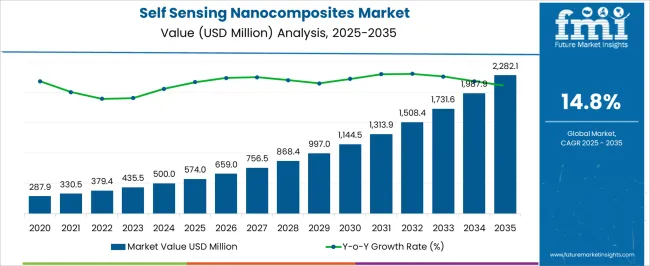
| Metric | Value |
|---|---|
| Self Sensing Nanocomposites Market Estimated Value in (2025 E) | USD 574.0 million |
| Self Sensing Nanocomposites Market Forecast Value in (2035 F) | USD 2282.1 million |
| Forecast CAGR (2025 to 2035) | 14.8% |
The self-sensing nanocomposites market holds a distinct position within its parent markets, accounting for approximately 6% of the total nanocomposites market. In the broader smart materials market, the self-sensing nanocomposites sector represents around 0.8% of the share, as this market includes a wide range of smart materials with diverse functionalities. Within the polymer nanocomposites market, the self-sensing segment holds a share of about 4%, driven by the increasing demand for advanced materials in various applications. In the structural health monitoring market, self-sensing nanocomposites are more prominent, capturing around 20% of the market share due to their ability to provide real-time monitoring in infrastructure projects. Finally, in the smart nano-construction materials market, the self-sensing nanocomposites segment holds an estimated 4% share, as these materials are increasingly being integrated into construction projects for enhanced performance and durability. Overall, while the self-sensing nanocomposites market remains a niche segment, it demonstrates significant growth potential across these broader parent markets, particularly in sectors such as infrastructure monitoring and advanced material applications.
Growth is being propelled by rising demand for smart infrastructure, intelligent manufacturing systems, and next-generation safety monitoring solutions. Integration of nanotechnology with composite materials has allowed for significant improvements in sensitivity, durability, and adaptability across a range of operating environments.
Advancements in material engineering, coupled with the ability to embed sensing functions directly into structural components, have reduced maintenance costs and extended service life for critical assets. The market is also benefiting from supportive government initiatives that encourage the adoption of smart materials for infrastructure resilience and industrial efficiency.
With expanding applications across aerospace, automotive, construction, and defense sectors, self-sensing nanocomposites are positioned for sustained growth. The combination of functional versatility, cost efficiency over time, and enhanced data acquisition capabilities ensures their relevance in the evolving landscape of smart materials.
The self-sensing nanocomposites market is segmented by nanoparticle type, sensing mechanism, application, end-use industry, and geographic regions. By nanoparticle type, self sensing nanocomposites market is divided into Carbon nanotubes, Graphene & graphene oxide, Metal oxides, Carbon black, and Others. In terms of sensing mechanism, self sensing nanocomposites market is classified into Electrical sensing, Thermal sensing, Optical sensing, Magnetic sensing, and Acoustic sensing.
Based on application, self sensing nanocomposites market is segmented into Structural health monitoring, Damage detection & repair, Stress & strain monitoring, Temperature sensing, Pressure sensing, and Others.
By end use industry, self sensing nanocomposites market is segmented into Construction & infrastructure, Automotive & aerospace, Healthcare, Electronics & electricals, Energy & power, and Others. Regionally, the self sensing nanocomposites industry is classified into North America, Latin America, Western Europe, Eastern Europe, Balkan & Baltic Countries, Russia & Belarus, Central Asia, East Asia, South Asia & Pacific, and the Middle East & Africa.
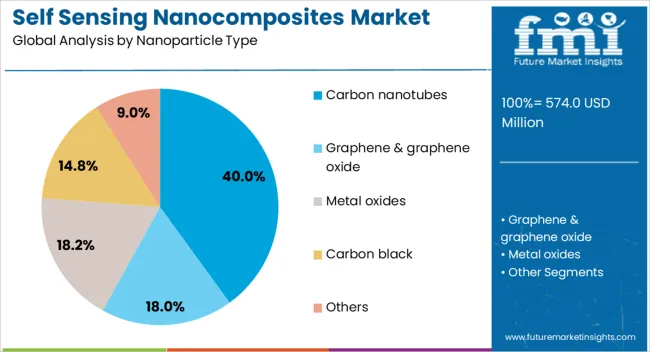
The carbon nanotube nanoparticle type segment is expected to hold 40% of the self-sensing nanocomposites market revenue share in 2025, making it the leading nanoparticle type. The segment's dominance has been supported by the exceptional electrical conductivity, mechanical strength, and large surface area of carbon nanotubes, which enhance sensing performance in composite materials.
Their compatibility with various polymer matrices allows for uniform dispersion and improved signal responsiveness, critical for accurate sensing. Demand has also been fueled by their ability to operate effectively under varying environmental conditions without significant degradation.
Continuous advancements in scalable production methods have reduced costs, making carbon nanotube integration more commercially viable. In applications where both mechanical reinforcement and high sensitivity are required, carbon nanotubes have demonstrated unmatched performance, reinforcing their position as the preferred choice for self-sensing nanocomposite production.
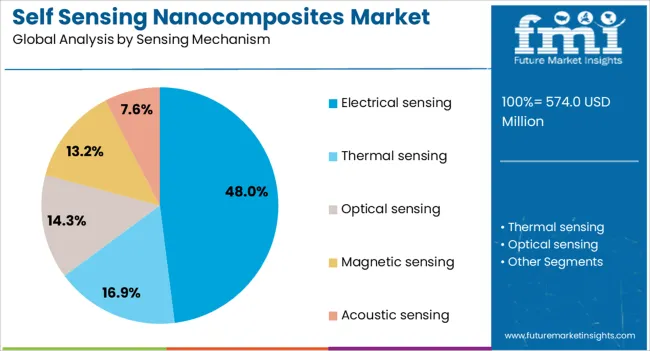
The electrical sensing mechanism segment is projected to account for 48% of the Self Sensing Nanocomposites market revenue share in 2025, establishing it as the leading sensing mechanism. Growth in this segment has been driven by the reliability and precision offered by electrical signal monitoring in detecting structural changes, strain, and stress within materials.
Electrical sensing mechanisms benefit from straightforward integration into composite structures and compatibility with a wide range of monitoring systems. The approach enables continuous, real-time data acquisition, which is essential for proactive maintenance and safety assurance in critical infrastructure and manufacturing environments.
Additionally, advances in nano-engineered conductive pathways have improved signal clarity and minimized noise interference, further enhancing performance. The scalability and cost-effectiveness of electrical sensing solutions have ensured widespread adoption across industries, solidifying their leading market position.
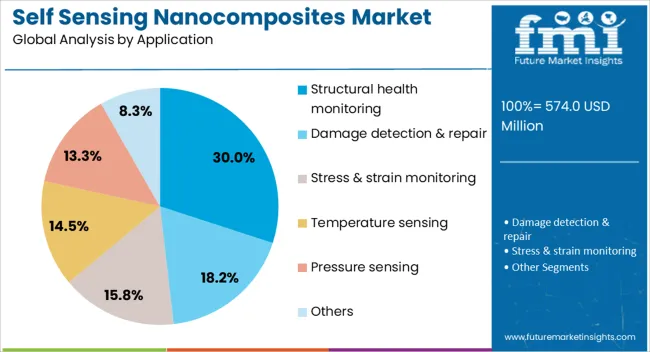
The structural health monitoring application segment is anticipated to hold 30% of the Self Sensing Nanocomposites market revenue share in 2025, making it the leading application segment. The increasing focus on infrastructure safety, asset longevity, and reduced maintenance costs has supported this leadership. Self-sensing nanocomposites in structural health monitoring allow for continuous evaluation of bridges, buildings, aircraft, and industrial equipment without the need for invasive inspections.
Their ability to detect minute structural changes before critical failure has made them indispensable in sectors where safety and reliability are paramount. The integration of these materials into infrastructure projects has been further encouraged by government regulations and funding programs aimed at enhancing resilience.
Technological advancements enabling accurate, real-time data analysis have enhanced decision-making for maintenance scheduling and asset management. The segment continues to grow as industries recognize the long-term cost savings and safety benefits associated with proactive structural monitoring.
The self-sensing nanocomposites market is set for substantial growth, driven by increasing demand across industries such as aerospace, automotive, and electronics. Opportunities in wearable technology and smart products will propel the market forward. However, challenges like high production costs and material reliability need to be tackled for broader adoption. As industries demand smarter, more responsive materials, the market for self-sensing nanocomposites will continue to evolve and expand.
The demand for self-sensing nanocomposites is gaining momentum, particularly in sectors such as aerospace, automotive, and construction. These advanced materials, capable of detecting and responding to environmental changes, are increasingly being integrated into applications that require real-time monitoring. Industries aiming for smarter, safer, and more durable products are seeking nanocomposites to improve performance. As safety standards evolve and industries look for materials with enhanced capabilities, the demand for self-sensing nanocomposites is expected to grow substantially, especially in critical sectors like defense and infrastructure.
Self-sensing nanocomposites are unlocking new opportunities in wearable technology and electronics. Their potential for integration into next-gen devices like health-monitoring wearables, smart clothing, and flexible electronics is profound. The ability to sense pressure, strain, and temperature in real time is revolutionizing product design, offering an edge in the competitive electronics market. These materials allow for the creation of more interactive, responsive devices that cater to the growing demand for personalized consumer electronics and health-tech applications, enhancing market growth potential.
A major trend shaping the self-sensing nanocomposites market is the increasing push towards multifunctionality in materials. The demand for materials that not only perform but also communicate with their environment is gaining traction. Self-sensing nanocomposites are at the forefront of this shift, with applications spanning from structural health monitoring to advanced energy harvesting systems. Their integration into robotics, aerospace, and automotive systems is expanding, providing higher operational efficiency. As industries realize the full potential of smart materials, the growth of this segment will accelerate further.
Despite the growth potential, the self-sensing nanocomposites market faces several challenges. The high cost of production and scalability issues present significant hurdles for widespread adoption. Manufacturers are grappling with balancing performance improvements and cost-effectiveness, which limits the accessibility of these materials to smaller companies. Furthermore, issues related to material degradation, reliability, and long-term performance in harsh environments need to be addressed to ensure commercial viability. These challenges are inhibiting faster penetration of self-sensing nanocomposites in mass-market applications.
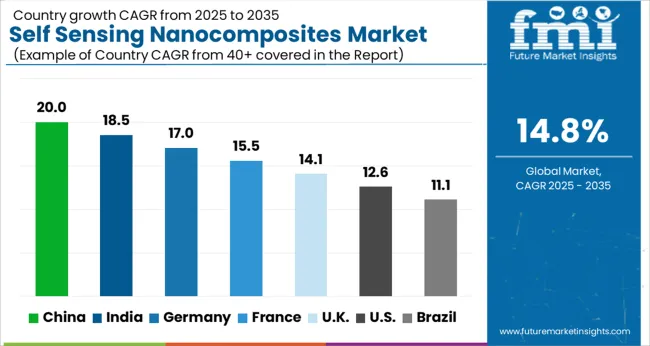
| Country | CAGR |
|---|---|
| China | 20.0% |
| India | 18.5% |
| Germany | 17.0% |
| France | 15.5% |
| UK | 14.1% |
| USA | 12.6% |
| Brazil | 11.1% |
The global self-sensing nanocomposites market is projected to grow at a CAGR of 14.8% from 2025 to 2035. China leads with a growth rate of 20%, followed by India at 18.5%, and France at 15.5%. The United Kingdom records a growth rate of 14.1%, while the United States shows the slowest growth at 12.6%. The demand for self-sensing nanocomposites is driven by the increasing adoption of smart materials in industries such as automotive, aerospace, and construction. As emerging markets like China and India experience rapid industrialization and infrastructure development, they are seeing higher growth in the adoption of advanced materials, while mature markets like the USA and the UK continue to focus on innovative applications in various industrial sectors. This report includes insights on 40+ countries; the top markets are shown here for reference.
The self-sensing nanocomposites market in China is projected to grow at a CAGR of 20%. China’s rapid industrialization and technological advancements play a significant role in this growth, particularly in the automotive and aerospace industries, where there is an increasing demand for intelligent materials capable of self-monitoring and adapting to environmental changes. The government’s push for innovations in smart materials and manufacturing processes has further accelerated the adoption of self-sensing nanocomposites. Additionally, China’s strong infrastructure development and growing focus on energy-efficient technologies contribute to the market's expansion.
The self-sensing nanocomposites market in India is expected to grow at a CAGR of 18.5%. The market’s growth is driven by increasing industrialization and the rising demand for smart materials in sectors like automotive, construction, and electronics. The Indian government’s initiatives to boost advanced manufacturing and the adoption of green technologies are playing a pivotal role in promoting the use of self-sensing materials. Additionally, India’s infrastructure development, particularly in smart cities and energy-efficient buildings, is accelerating the demand for nanocomposites with self-monitoring capabilities.
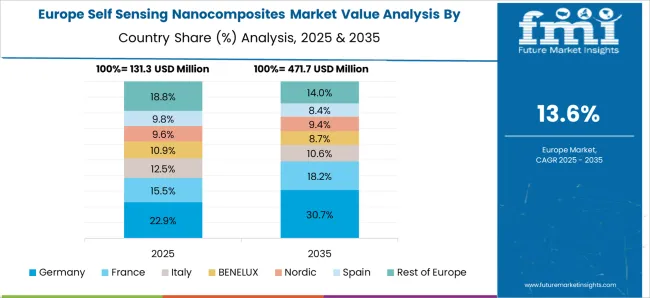
The self-sensing nanocomposites market in France is projected to grow at a CAGR of 15.5%. France’s emphasis on environmental sustainability and advanced manufacturing technologies has made it a key market for self-sensing materials. The automotive and aerospace industries, where the demand for lightweight and intelligent materials is increasing, are significant contributors to this growth. Additionally, France’s regulatory environment promoting energy-efficient and sustainable solutions further accelerates the use of nanocomposites in a wide range of applications, from transportation to infrastructure.
The self-sensing nanocomposites market in the UK is projected to grow at a CAGR of 14.1%. The UK’s growing focus on sustainable technologies and smart materials is driving the demand for self-sensing nanocomposites, particularly in industries like automotive, construction, and electronics. The government’s initiatives aimed at reducing carbon emissions and promoting green building practices further fuel this demand. As industries seek advanced materials to enhance efficiency and reduce environmental impact, the UK remains a key market for nanocomposites with self-sensing capabilities.
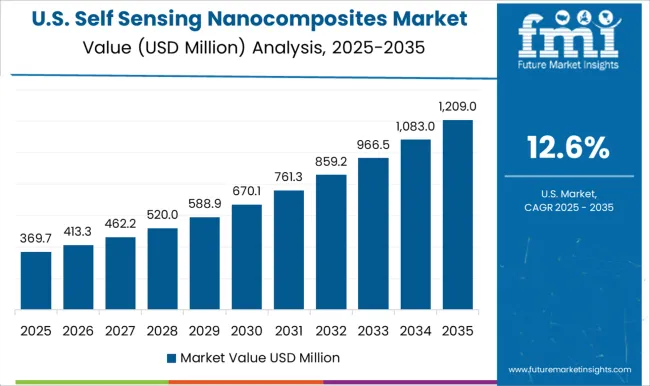
The self-sensing nanocomposites market in the USA is projected to grow at a CAGR of 12.6%. The market in the USA is driven by the aerospace, automotive, and construction industries, where the demand for self-sensing materials is increasing to improve efficiency and reduce costs. The USA government’s focus on innovation and advanced manufacturing, combined with the rising demand for smart materials in infrastructure projects and energy-efficient buildings, continues to support market growth. Despite slower growth compared to emerging markets, the ongoing push for sustainability and technological advancements ensures steady expansion.
In the self-sensing nanocomposites market, OCSiAl, Cabot, and Nanocyl stand out as key players, leading advancements in the development of carbon nanotube-based solutions. These companies have established their dominance by introducing cutting-edge products that cater to industries such as automotive, aerospace, and electronics, where precision and efficiency are paramount.
Their ability to integrate self-sensing properties into nanocomposite materials allows for enhanced structural monitoring, paving the way for safer and more efficient applications. OCSiAl, for instance, has capitalized on its expertise in carbon nanotubes, offering solutions that meet the growing demand for intelligent, high-performance materials.
Cabot and Nanocyl follow suit with their innovative offerings, positioning themselves as trusted suppliers of self-sensing nanocomposites in a variety of industrial applications. The competitive landscape is further influenced by companies like Showa Denko, Arkema, and Hexcel, which continue to expand their portfolios by incorporating self-sensing technologies into their composite materials. Showa Denko leverages its extensive experience in nanomaterial technology, while Arkema’s advancements in smart materials have set new standards for the industry. Hexcel, recognized for its aerospace-grade composites, is gradually integrating self-sensing functionalities to enhance product performance in critical applications.
This competitive environment is characterized by intense R&D efforts, with these companies striving to capture market share through innovations in material science, improved processing methods, and strategic partnerships to push the limits of nanocomposite capabilities. The race for dominance in this rapidly evolving market is marked by a focus on enhancing material intelligence and performance efficiency.
| Item | Value |
|---|---|
| Quantitative Units | USD 574.0 Million |
| Nanoparticle Type | Carbon nanotubes, Graphene & graphene oxide, Metal oxides, Carbon black, and Others |
| Sensing Mechanism | Electrical sensing, Thermal sensing, Optical sensing, Magnetic sensing, and Acoustic sensing |
| Application | Structural health monitoring, Damage detection & repair, Stress & strain monitoring, Temperature sensing, Pressure sensing, and Others |
| End Use Industry | Construction & infrastructure, Automotive & aerospace, Healthcare, Electronics & electricals, Energy & power, and Others |
| Regions Covered | North America, Europe, Asia-Pacific, Latin America, Middle East & Africa |
| Country Covered | United States, Canada, Germany, France, United Kingdom, China, Japan, India, Brazil, South Africa |
| Key Companies Profiled | OCSiAl, Cabot, Nanocyl, Showa Denko, Arkema, and Hexcel / Other composites firms |
| Additional Attributes | Dollar sales by material type (carbon-based, metal-based, polymer-based), Dollar sales by application (structural health monitoring, aerospace, automotive, civil engineering), Trends in self-healing and self-monitoring capabilities, Adoption in smart textiles and wearable electronics, Growth in energy storage and conversion applications, Regional patterns of nanocomposite adoption in construction and automotive industries. |
The global self sensing nanocomposites market is estimated to be valued at USD 574.0 million in 2025.
The market size for the self sensing nanocomposites market is projected to reach USD 2,282.1 million by 2035.
The self sensing nanocomposites market is expected to grow at a 14.8% CAGR between 2025 and 2035.
The key product types in self sensing nanocomposites market are carbon nanotubes, graphene & graphene oxide, metal oxides, carbon black and others.
In terms of sensing mechanism, electrical sensing segment to command 48.0% share in the self sensing nanocomposites market in 2025.






Full Research Suite comprises of:
Market outlook & trends analysis
Interviews & case studies
Strategic recommendations
Vendor profiles & capabilities analysis
5-year forecasts
8 regions and 60+ country-level data splits
Market segment data splits
12 months of continuous data updates
DELIVERED AS:
PDF EXCEL ONLINE
Self-propelled Orchard Top-cutting Machines Market Forecast and Outlook 2025 to 2035
Self-healing Network Market Size and Share Forecast Outlook 2025 to 2035
Self-administered Biologics Market Size and Share Forecast Outlook 2025 to 2035
Self-fusing Silicone Tape Market Size and Share Forecast Outlook 2025 to 2035
Self-administered Parenteral Market Size and Share Forecast Outlook 2025 to 2035
Self-Adhesive Dual-Cure Luting Cement Market Size and Share Forecast Outlook 2025 to 2035
Self Cooling Packaging Market Size and Share Forecast Outlook 2025 to 2035
Self-service Analytics Market Size and Share Forecast Outlook 2025 to 2035
Self-Compacting Concrete Market Size and Share Forecast Outlook 2025 to 2035
Self-adhesive Tear Tape Market Size and Share Forecast Outlook 2025 to 2035
Self-Adhesive Labels Market Size and Share Forecast Outlook 2025 to 2035
Self-Healing Concrete Market Size and Share Forecast Outlook 2025 to 2035
Self-repairing Polymers Market Size and Share Forecast Outlook 2025 to 2035
Self Cooled Transformer Market Size and Share Forecast Outlook 2025 to 2035
Self-Lubricating Bearings Market Size and Share Forecast Outlook 2025 to 2035
Self - Locking Trays Market Size and Share Forecast Outlook 2025 to 2035
Self-urinary Infection Testing Market Size and Share Forecast Outlook 2025 to 2035
Self-chilling Cans Market Size and Share Forecast Outlook 2025 to 2035
Self-Service BI Market Size and Share Forecast Outlook 2025 to 2035
Self-checkout Systems Market Analysis by Portable Self-Checkout Devices and Stationary Self-Checkout Kiosks Through 2035

Thank you!
You will receive an email from our Business Development Manager. Please be sure to check your SPAM/JUNK folder too.
Chat With
MaRIA